Listen to This Article:
Some chefs spend their childhoods dreaming of kitchens. Others, like Marc Mole, take a more winding path—one that begins with architectural blueprints in Paris and leads, eventually, to the hum of a school kitchen in northern England.
A graduate of Auguste Escoffier School of Culinary Arts, a former pastry chef at a beloved French bistro in Washington, D.C., and a member of the prestigious Disciples Escoffier International, Marc’s journey is marked by resilience and reinvention. Whether adapting to life in a new country, returning to scratch cooking while caring for his wife, or cooking daily for hundreds of at-risk students, Marc has continually found ways to pivot, rebuild, inspire, and feed others with care.
Paris, Plans, and a Quiet Love of Food
Marc’s story begins with deep cultural roots. His parents immigrated to France in the 1960s, bringing with them a rich heritage from the former Yugoslavia, with family origins in what are now Slovenia, Croatia, and Serbia. That blend of backgrounds laid the foundation for a diverse and flavorful relationship with food, one rooted in tradition, practicality, and home cooking.
“I have been lucky to have a mother, a grandmother, and family who were all cooking at home,” he says. In Marc’s early childhood, cooking from scratch wasn’t a philosophy, it was simply how things were done. That quiet, everyday exposure to home cooking would come back to shape him in powerful ways, though he wouldn’t know it at the time.
Fast forward to his early 20s, and Marc was living in Paris and following in his family’s footsteps, though in a slightly different form. Coming from a long line of architects, he chose to pursue the same path, enrolling in architecture school and earning a PhD in 2000 after six years of study. By his mid-forties, he had built a thriving architecture business, working across France and raising a young family.
But when his wife was offered a role with the World Bank in Washington, D.C., Marc and his family saw an opportunity for something new. What he didn’t know then was that this move would become a defining turning point—one that would eventually lead him, quite unexpectedly, to the kitchen.
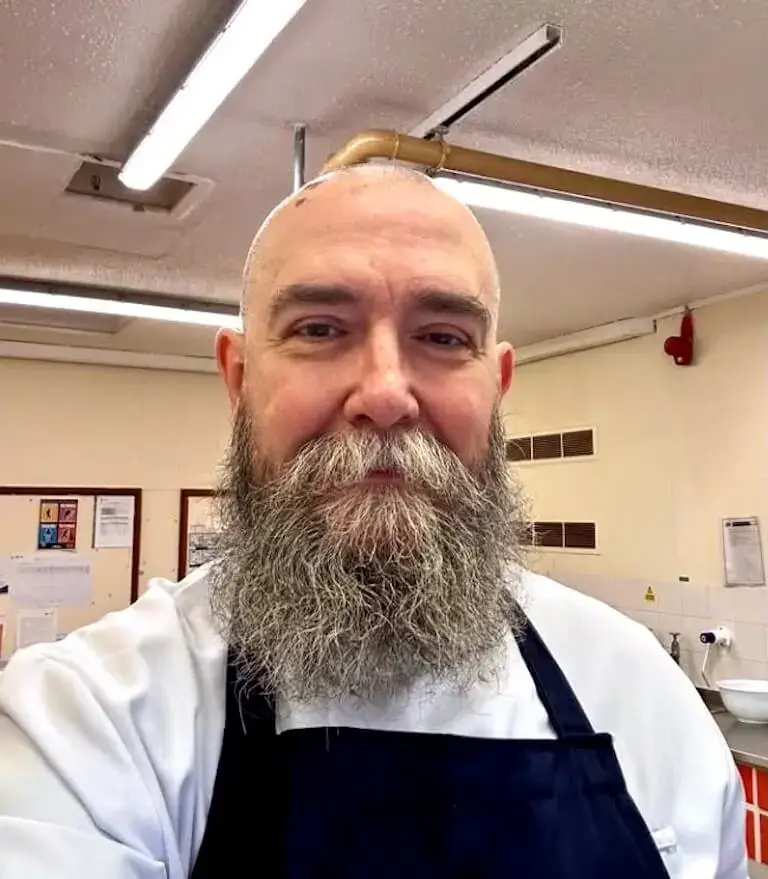
He dons a chef’s apron now, but Marc Mole’s journey began in architecture.
A Fork in the Road
All packed and ready to move to D.C., Marc and his family encountered a small hitch in the plan: the PhD Marc had earned in France was not recognized in the U.S.
As a result, Marc took on the role of primary caretaker for his children while helping the family settle into their new life. During that first year, he began to wonder if this was a chance to explore a new career path.
Not long after, Marc crossed paths with another French expat who owned a local produce company. The two hit it off, and Marc eventually joined the business as an account manager. The job gave him a front-row seat to the local restaurant scene: visiting kitchens, meeting chefs, and getting a firsthand look at the ins and outs of the food world.
Then, in 2013, everything shifted again.
Marc’s wife was diagnosed with breast cancer, and his attention turned fully toward his family. During her treatment, he returned to the kind of cooking he’d grown up with, preparing meals from scratch, rooted in comfort and care.
“When I grew up, we didn’t have ready-to-eat or pre-packed food,” he says. “I went back to scratch—everything.” Food became both a practical need and a personal anchor. Influenced by memories of cooking alongside his mother and grandmother, Marc reconnected with the values he’d grown up with: real, homemade food made with seasonal ingredients and intention.
As he continued working at the produce company and supporting his family through treatment and recovery, something began to shift. The kitchen no longer felt like a backup plan, but more like a calling. Then came a chance encounter with a revered French chef—one that would change the trajectory of his life entirely.
A Chef, a Mentor, a Turning Point
Marc first met Chef Francis Layrle through his work at the produce company. Layrle, a respected French chef from the Gascony region, had built an impressive career in D.C., first as chef de cuisine at the French Embassy, where he cooked for seven ambassadors, and later as head chef at La Piquette, a French bistro in Cleveland Park. It was at this beloved neighborhood bistro that Marc and Layrle’s paths crossed.
The two quickly connected. Layrle encouraged Marc’s growing interest in food, especially his curiosity around food traceability, from-scratch cooking, and preparing healthful foods for his family. Their conversations sparked something deeper within Marc, and the idea of culinary school began to take shape. Marc also wanted to pursue skills that felt more universally transferable, whether he stayed in the U.S., returned to Europe, or landed somewhere entirely new.
With that in mind, he began researching programs and eventually reached out to Escoffier’s online culinary school.
“At 45, I thought to myself, if I don’t do it now, I will never do it. So I started again,” Marc shares. The flexibility of the program allowed him to remain close to his family while building a new skill set.
Once Marc was enrolled, Layrle offered him an apprenticeship at La Piquette, giving Marc the rare opportunity to apply what he was learning in real time, working side by side with a chef who had once cooked for dignitaries, and now, was helping to shape Marc’s next chapter.
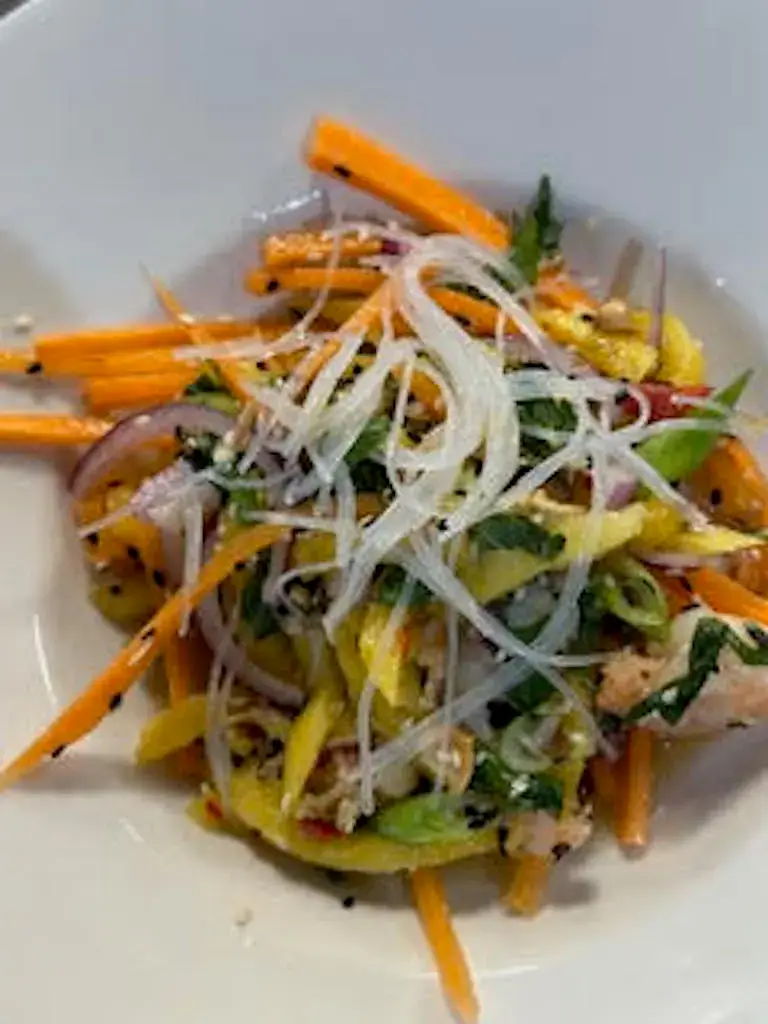
A vibrant salad Marc prepared during his time at La Piquette.
Sharpening Skills, One Station at a Time
While enrolled in Escoffier’s online program, Marc spent six months apprenticing at La Piquette under Layrle’s mentorship. He threw himself into the work, moving through every station in the kitchen, from meat to entremetier, and eventually, pastry.
When the bistro’s pastry chef prepared to move on, Marc was offered the opportunity to take over the station. He accepted, and remained in the role for the next two years, deepening his skills and building confidence in a professional kitchen.
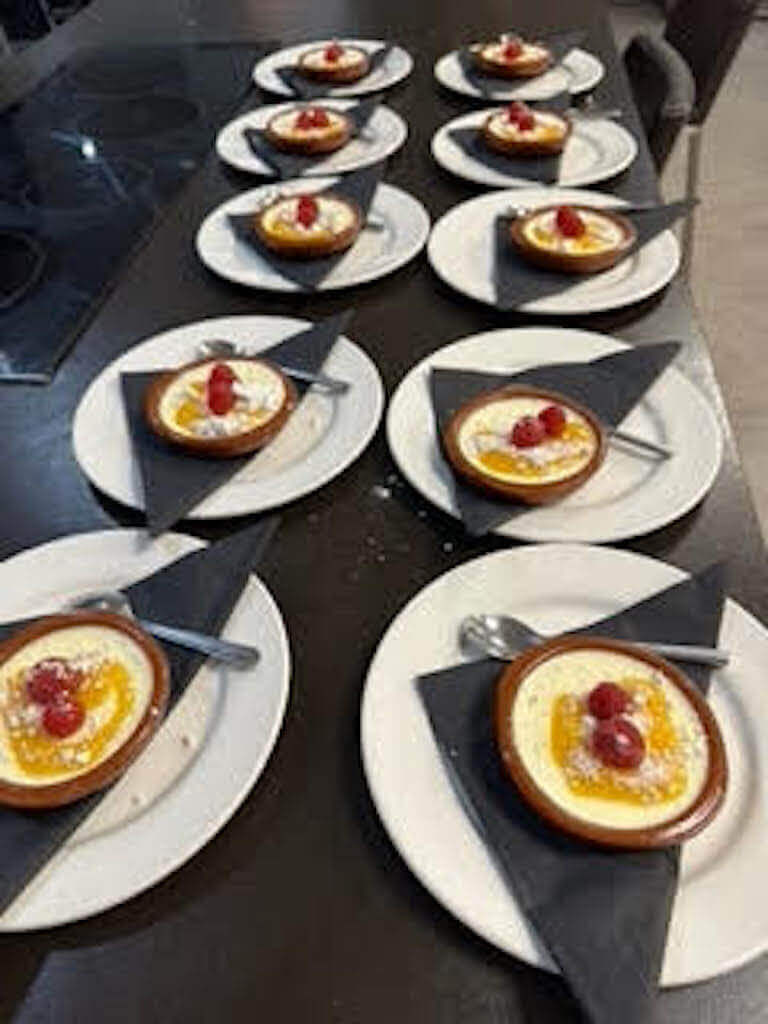
Individual custard tarts with fresh fruit, prepped for service at La Piquette, where Marc trained under Chef Layrle.
During that time, he completed his studies and graduated from Escoffier. Not long after, he was selected by the school to serve as a mentor for incoming students, thanks to both his academic strength and the practical insights he could offer from his real-life experience.
Another Country, Another Pivot
By June 2017, Marc and his wife were ready for a new chapter, this time in the UK, where she was originally from.
But just as they were settling in, life shifted again. In August 2018, his wife was diagnosed with another form of cancer; this time, acute leukemia. She underwent intensive chemotherapy, followed by weeks of hospitalization for close monitoring.
As he had before, Marc balanced caregiving with the need to keep moving forward. He found work in Stockport, just outside Manchester, first as a producer and later as a chef de partie at a local restaurant. It was a demanding stretch—emotionally and physically—but one that further sharpened his resilience.
Then came another blow: the COVID-19 pandemic. Like so many others in hospitality, Marc was made redundant.
Still, he pivoted. Before the shutdowns began, Marc had already started sketching out his next move, a plan to open his own French bistro in Stockport. It was a project that would bring together everything he loved: food, community, and the chance to design something from the ground up, blending his past life in architecture with his new life in the kitchen.
Where Blueprints and Menus Meet
When a former architect walks into a historic building, something magical happens. Marc found the perfect spot for his next chapter: a 19th-century building in Stockport, once home to a jeweller’s shop. The space had charm, character, and history—and, as a Grade II listed building (a designated historic property), a host of preservation challenges.
Over the next three years, often slowed or delayed by the pandemic, Marc and his wife, now on the mend, painstakingly restored the space, breathing new life into its original features while layering in his own vision. It was a full-circle moment: his architectural background shaping the space, his culinary passion shaping the menu.
In 2022, Bistro Marc at Winter’s officially opened its doors. The menu featured French bistro classics like steak frites, duck confit, and cassoulet, many of them inspired by the dishes Marc once made with Layrle in D.C.
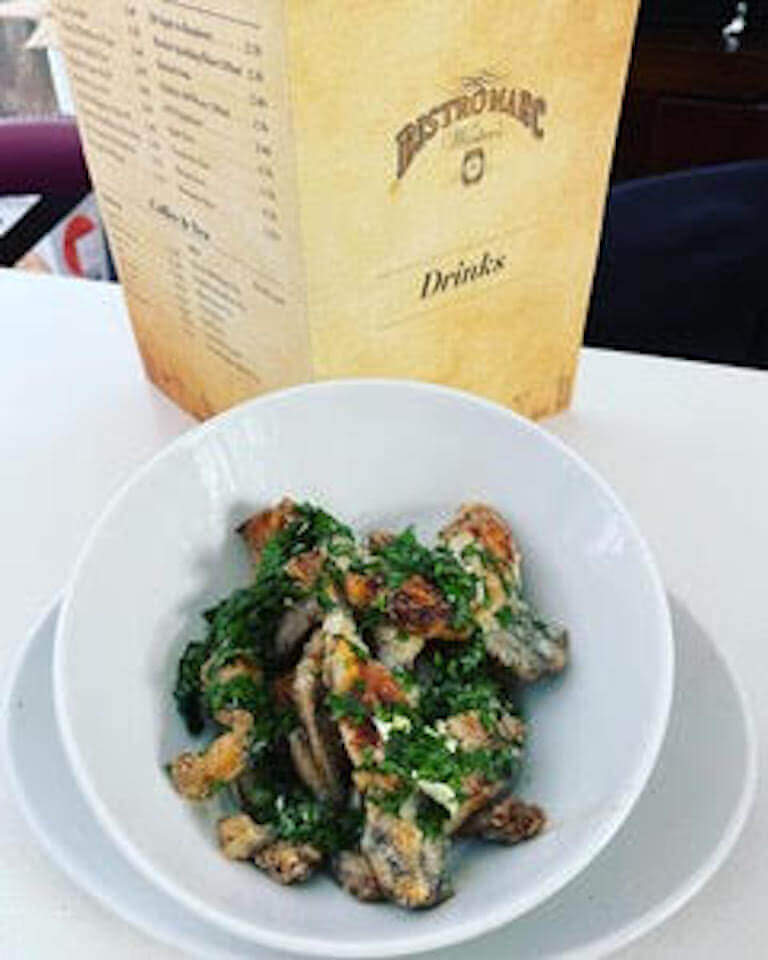
One of Marc’s signature dishes from Bistro Marc, pan-fried frogs with salsa verde seasoning.
The reviews were glowing. The hours were long. “We were open from Wednesday to Sunday, from 11 to 11 at night,” Marc says. “I was there every day at 8:30 in the morning to close in the evening. I worked 100 hours a week, if not more.”
But despite the early success, energy costs had skyrocketed to nearly five times what they were when he opened, making the business unsustainable. After just 18 months, Marc was forced to make the heartbreaking decision to close. But even in the wake of that loss, he kept moving forward. The kitchen, it seemed, still had more to offer, and Marc had more people to feed.
Trading Tablecloths for School Trays
After closing the bistro, Marc pivoted once more, this time into freelance teaching. He joined Food Sorcery, a hands-on cookery and baking school in Manchester, where he helped build out classes in French cooking, Korean cooking, bread baking, and more. It didn’t take long for him to realize how much he loved sharing what he knew.
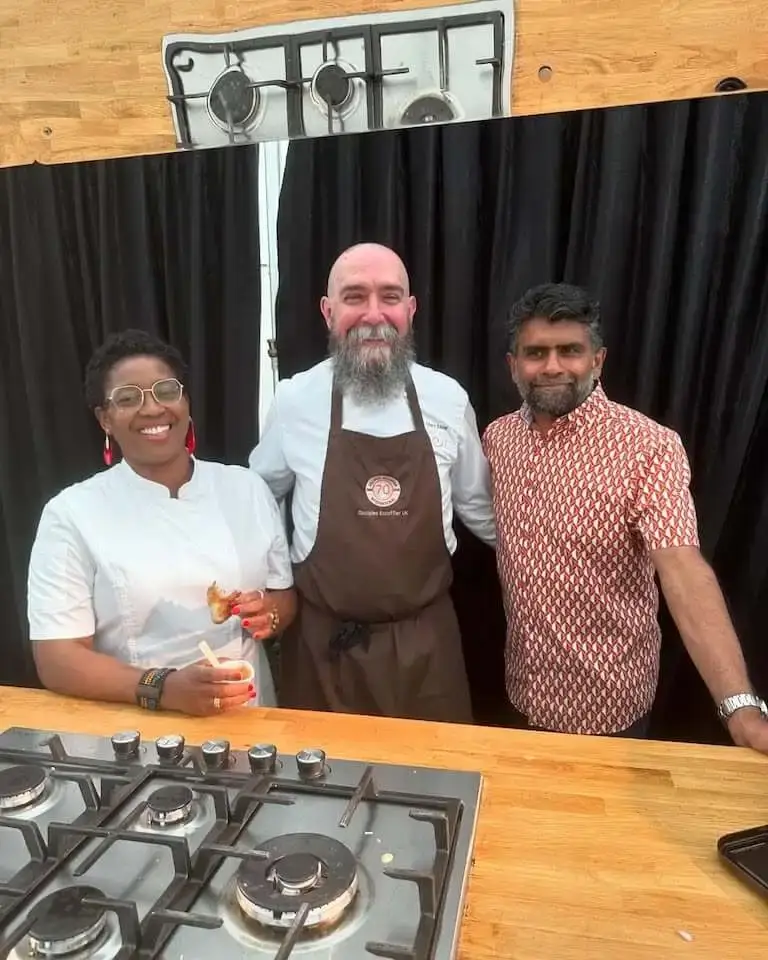
Chef Marc Mole with fellow chefs during a live cooking event.
Around the same time, Marc received another major milestone: he was inducted into the UK chapter of the Disciples Escoffier, a prestigious global culinary organization founded to honor the legacy of Auguste Escoffier. The honor recognized not only his skill, but his dedication to mentorship, tradition, and culinary education.
While Marc was thriving as an instructor, he was still looking for something a little more stable. So when an opportunity came through Stockport Council to run a school kitchen, Marc was intrigued. After a rigorous interview process which required he obtained 19 certifications, ranging from food hygiene to mental health awareness, Marc accepted a full-time role that allowed him to bring his culinary values into a new and deeply meaningful setting.
Now, he’s in charge of an entire school kitchen that serves roughly 350 meals a day to students, teachers, and staff. He manages everything himself: meal planning, prep, cooking, dishwashing, cleaning, ordering, and maintaining compliance with strict UK school food regulations. The students he cooks for are part of an alternative education program, many of whom are navigating difficult home situations.
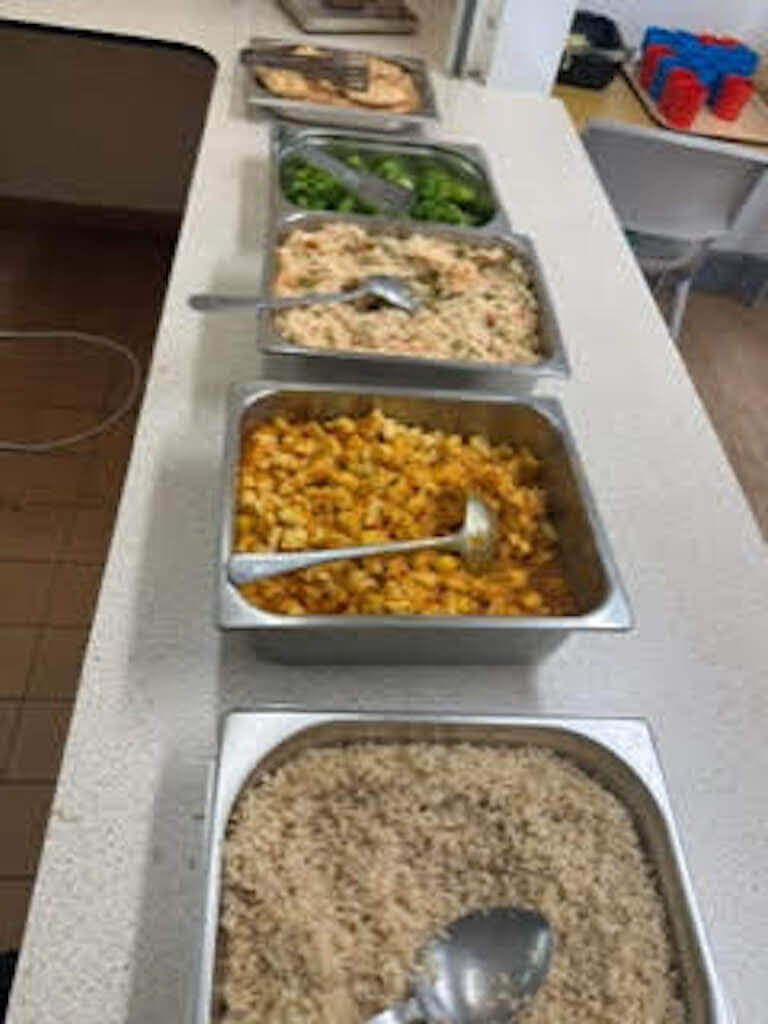
Marc prepares daily meals for around 350 students, adjusting dishes based on their feedback and nutrition needs.
“Some of these kids may not have a proper meal outside of school,” Marc says. “At least I know they have one good meal today.”
Marc adapts the menus based on student feedback, creating meals that meet nutritional standards without sacrificing flavor or care. He’s also helped tailor the menu cycle to better fit the unique needs of his school. While many institutions operate on a rigid three-week rotation, Marc created a two-week plan that’s more realistic, and more responsive to what his students actually want to eat.
The setting may have changed from his initial culinary path, but Marc’s commitment to food and the people he serves hasn’t. Behind every meal, whether plated in a bistro or served on a school tray, is a philosophy that’s guided him all along.
Traceability, Seasonality, and a Return to Real Food
Now in his 50s, Marc’s passion for food isn’t something he chased from a young age, it’s something he chose after 45, when starting over felt daunting, necessary, and perhaps a little bit exciting. His story is a reminder that reinvention can happen at any age, and that it’s never too late to build a life shaped by intention.
Throughout his culinary journey, Marc has remained grounded in a few key principles: cook with care, honor the seasons, and know where your food comes from. From nourishing his family during his wife’s illnesses to designing school menus centered around whole ingredients, he has consistently championed food that’s thoughtful, honest, and real.
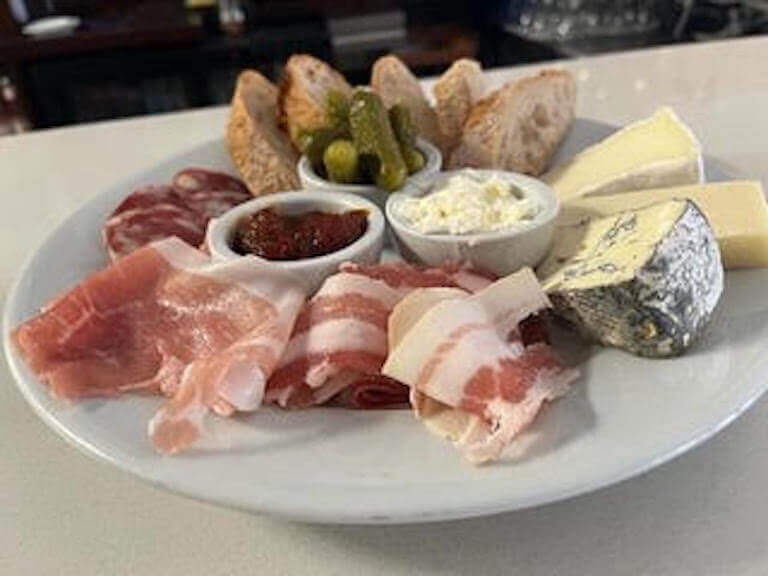
A charcuterie plate served at Bistro Marc, celebrating Marc’s French roots and seasonal sensibility.
But Marc also sees a troubling pattern, especially in the U.S., where that connection to food has faded. Many people have lost touch with where their food comes from, and defining what counts as “good” food has become one of the biggest challenges in today’s food system. “What is food? Somebody took a gum and erased it,” he says.
With his gained experience in bistros, cooking courses, and institutional kitchens, Marc hopes to one day step into a teaching role to teach others about traceability, seasonality, and what a return to real food might look like.
From the Drawing Board to the Cutting Board…and Beyond
Marc’s journey is a testament to resilience, reinvention, and finding purpose in unexpected places.
He’s gone from sketching buildings in Paris, to plating pastries in D.C., to preparing daily meals for students who may not have a hot meal at home. Along the way, Marc has returned to the values he first learned in his childhood kitchen—values passed down by his mother and grandmother, now reimagined in classrooms, bistros, and school cafeterias.
The work looks different now than when he started, but the heart of it hasn’t changed: it’s still about creating comfort, care, and connection through food.
“At the bistro, guests would thank me after a good meal,” Marc says. “Now, 300 students wave and say, ‘See you tomorrow, Marc.’ It means just as much.”
If you’re inspired by Marc’s journey, culinary school can open up a world of possibilities. Learn more today about Escoffier’s Culinary Arts program and take the first step in your own culinary adventure.
CONSIDER THESE ARTICLES FOR YOUR NEXT READ:
- Top Remote Culinary Jobs: A Brief Guide
- Is Being a Chef a Good Career Choice?
- 13 Great Careers in the Food Industry

